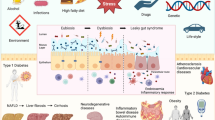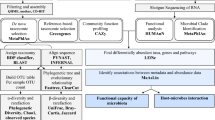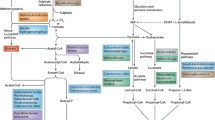Abstract
Background
Human gut microbiota is involved in host health and disease development. Investigations of age-related and sex-related alterations in gut microbiota are limited, and the association between stool consistency and gut microbiota has not been fully investigated. We investigated gut microbiota differences related to age, sex, and stool consistency in healthy Japanese subjects.
Methods
Two-hundred and seventy-seven healthy Japanese subjects aged 20–89 years were enrolled. Fecal samples were obtained to analyze the gut microbiome. We evaluated the association between stool consistency [Bristol stool scale (BSS)] and gut microbiota.
Results
Although there were significant differences in the microbial structure between males and females, the α-diversity of gut microbiota showed no difference between males and females or among age groups. There were significant increases in genera Prevotella, Megamonas, Fusobacterium, and Megasphaera and Bifidobacterium, Ruminococcus, and Akkermansia in males and females, respectively. The ratio of hard stools (BSS types 1 and 2) was higher in females; the ratio of loose stools (BSS type 6) was higher in males. No younger male had BSS type 1 or type 2. Fusobacterium in males was significantly higher in the loose consistency group, and Oscillospira was significantly higher in the hard consistency group in males; Campylobacter, SMB53, and Turicibacter were significantly higher in the hard consistency group in females.
Conclusions
Several changes in gut microbiota were associated with age and sex. Stool consistency and gut microbiota associations emphasized the importance of stool consistency assessments to understand intestinal function.








Similar content being viewed by others
Change history
06 September 2018
The authors would like to correct the errors in the publication of the original article. The correction details are given below for your reading.
References
Lynch SV, Pedersen O. The human intestinal microbiome in health and disease. N Engl J Med. 2016;375:2369–79.
Clemente JC, Ursell LK, Parfrey LW, et al. The impact of the gut microbiota on human health: an integrative view. Cell. 2012;148:1258–70.
Kedia S, Rampal R, Paul J, et al. Gut microbiome diversity in acute infective and chronic inflammatory gastrointestinal diseases in North India. J Gastroenterol. 2016;51:660–71.
Ley RE, Turnbaugh PJ, Klein S, et al. Microbial ecology: human gut microbes associated with obesity. Nature. 2006;444:1022–3.
Vandeputte D, Falony G, Vieira-Silva S, et al. Stool consistency is strongly associated with gut microbiota richness and composition, enterotypes and bacterial growth rates. Gut. 2016;65:57–62.
Tigchelaar EF, Bonder MJ, Jankipersadsing SA, et al. Gut microbiota composition associated with stool consistency. Gut. 2016;65:540–2.
Hadizadeh F, Walter S, Belheouane M, et al. Stool frequency is associated with gut microbiota composition. Gut. 2017;66:559–60.
Longstreth GF, Thompson WG, Chey WD, et al. Functional bowel disorders. Gastroenterology. 2006;130:1480–91.
Degen LP, Phillips SF. How well does stool form reflect colonic transit? Gut. 1996;39:109–13.
Consortium THMP. Structure, function and diversity of the healthy human microbiome. Nature. 2012;486:207–14.
Arumugam M, Raes J, Pelletier E, et al. Enterotypes of the human gut microbiome. Nature. 2011;473:174–80.
Nishijima S, Suda W, Oshima K, Kim SW, Hirose Y, Morita H, et al. The gut microbiome of healthy Japanese and its microbial and functional uniqueness. DNA Res. 2016;23:125–33.
Nakayama J, Watanabe K, Jiang J, et al. Diversity in gut bacterial community of school-age children in Asia. Sci Rep. 2015;5:8397.
Heaton KW, Radvan J, Cripps H, et al. Defecation frequency and timing, and stool form in the general population: a prospective study. Gut. 1992;33:818–24.
Inoue R, Ohue-Kitano R, Tsukahara T, et al. Prediction of functional profiles of gut microbiota from 16S rRNA metagenomic data provides a more robust evaluation of gut dysbiosis occurring in Japanese type 2 diabetic patients. J Clin Biochem Nutr. 2017;61:217–21.
Nishino K, Nishida A, Inoue R, et al. Analysis of endoscopic brush samples identified mucosa-associated dysbiosis in inflammatory bowel disease. J Gastroenterol. 2018;53:95–106.
Takagi T, Naito Y, Inoue R, et al. The influence of long-term use of proton pump inhibitors on the gut microbiota: an age-sex-matched case-control study. J Clin Biochem Nutr. 2018;62:100–5.
Caporaso JG, Kuczynski J, Stombaugh J, Bittinger K, Bushman FD, Costello EK, et al. QIIME allows analysis of high-throughput community sequencing data. Nat Methods. 2010;7:335–6.
Edgar RC. Search and clustering orders of magnitude faster than BLAST. Bioinformatics (Oxford, England). 2010;26:2460–1.
Edgar RC, Haas BJ, Clemente JC, et al. UCHIME improves sensitivity and speed of chimera detection. Bioinformatics (Oxford, England). 2011;27:2194–200.
Koliada A, Syzenko G, Moseiko V, et al. Association between body mass index and Firmicutes/Bacteroidetes ratio in an adult Ukrainian population. BMC Microbiol. 2017;17:120.
Ley RE, Backhed F, Turnbaugh P, et al. Obesity alters gut microbial ecology. Proc Natl Acad Sci USA. 2005;102:11070–5.
Mathur R, Barlow GM. Obesity and the microbiome. Expert Rev Gastroenterol Hepatol. 2015;9:1087–99.
Ignacio A, Fernandes MR, Rodrigues VA, et al. Correlation between body mass index and faecal microbiota from children. Clin Microbiol Infect. 2016;22:258.e1–e8.
Schwiertz A, Taras D, Schafer K, et al. Microbiota and SCFA in lean and overweight healthy subjects. Obesity (Silver Spring, Md). 2010;18:190–5.
Odamaki T, Kato K, Sugahara H, et al. Age-related changes in gut microbiota composition from newborn to centenarian: a cross-sectional study. BMC Microbiol. 2016;16:90.
Wang JJ, Wang J, Pang XY, et al. Sex differences in colonization of gut microbiota from a man with short-term vegetarian and inulin-supplemented diet in germ-free mice. Sci Rep. 2016;6:36137.
Markle JG, Frank DN, Mortin-Toth S, et al. Sex differences in the gut microbiome drive hormone-dependent regulation of autoimmunity. Science. 2013;339:1084–8.
Org E, Mehrabian M, Parks BW, et al. Sex differences and hormonal effects on gut microbiota composition in mice. Gut Microbes. 2016;7:313–22.
Fransen F, van Beek AA, Borghuis T, et al. The impact of gut microbiota on gender-specific differences in immunity. Front Immunol. 2017;8:754.
Yatsunenko T, Rey FE, Manary MJ, et al. Human gut microbiome viewed across age and geography. Nature. 2012;486:222–7.
Sonnenburg JL, Backhed F. Diet-microbiota interactions as moderators of human metabolism. Nature. 2016;535:56–64.
Kasai C, Sugimoto K, Moritani I, et al. Comparison of the gut microbiota composition between obese and non-obese individuals in a Japanese population, as analyzed by terminal restriction fragment length polymorphism and next-generation sequencing. BMC Gastroenterol. 2015;15:100.
Lewis SJ, Heaton KW. Stool form scale as a useful guide to intestinal transit time. Scand J Gastroenterol. 1997;32:920–4.
Tian H, Ge X, Nie Y, et al. Fecal microbiota transplantation in patients with slow-transit constipation: a randomized, clinical trial. PLoS One. 2017;12:e0171308.
Halkjaer SI, Boolsen AW, Gunther S, et al. Can fecal microbiota transplantation cure irritable bowel syndrome? World J Gastroenterol. 2017;23:4112–20.
Abadi ATB. Fecal microbiota transplantation against irritable bowel syndrome? Rigorous randomized clinical trials are required. World J Gastrointest Pharmacol Ther. 2017;8:208–9.
Mizuno S, Masaoka T, Naganuma M, et al. Bifidobacterium-rich fecal donor may be a positive predictor for successful fecal microbiota transplantation in patients with irritable bowel syndrome. Digestion. 2017;96:29–38.
Agrawal A, Houghton LA, Morris J, et al. Clinical trial: the effects of a fermented milk product containing Bifidobacterium lactis DN-173 010 on abdominal distension and gastrointestinal transit in irritable bowel syndrome with constipation. Aliment Pharmacol Ther. 2009;29:104–14.
Kim HJ, Vazquez Roque MI, Camilleri M, et al. A randomized controlled trial of a probiotic combination VSL# 3 and placebo in irritable bowel syndrome with bloating. Neurogastroenterol Motil. 2005;17:687–96.
Acknowledgements
This work was supported by grants-in-aid for Scientific Research (KAKENHI) to Tomohisa Takagi (grant no. 16K09322) and Yuji Naito (grant no. 16H05289) from the Japan Society for the Promotion of Science and by the Grant of Industry-Academia-Government Collaboration of “Field for Knowledge Integration and Innovation” (FKII) to Yuji Naito (no. 28020006) from the Ministry of Agriculture, Forestry, and Fisheries of Japan. This work was performed in collaboration with Takara Bio Inc.
Author information
Authors and Affiliations
Contributions
TT, NY, IR, and KS conceived the experiments; TT, UK, DO, YN, KK, IT, HO, and KH collected feces; OK, TY, and OH performed analyses of fecal bacteria; IR, KS, MK, and TA analyzed data; and TT, NY, and IY were involved in editing the manuscript. All authors discussed the results and commented on the manuscript.
Corresponding author
Ethics declarations
Conflict of interest
Dr. Tomohisa Takagi received lecture fees from Mochida Pharm. Co. Ltd. and Miysubishi Tanabe Pharma Co. Dr. Yuji Naito received scholarship funds from EA Pharma. Co. Ltd. and collaboration research funds from Fujifilm Medical Co., Ltd. and has been paid lecture fees by Janssen Pharma K.K., Mylan EPD Co., Takeda Pharma Co., Ltd., Mochida Pharm. Co., Ltd., EA Pharma Co., Ltd., Otsuka Pharma Co., Ltd., and Astellas Pharma Co., Ltd. Dr. Yoshito Itoh is affiliated with a department funded by donations from Nichinichi Pharmaceutical Co., Ltd. and has received research grants from Takeda Pharmaceutical Co., Ltd. and EA Pharma Co., Ltd. The other authors have no conflicts of interest to declare.
Electronic supplementary material
Below is the link to the electronic supplementary material.
Rights and permissions
About this article
Cite this article
Takagi, T., Naito, Y., Inoue, R. et al. Differences in gut microbiota associated with age, sex, and stool consistency in healthy Japanese subjects. J Gastroenterol 54, 53–63 (2019). https://doi.org/10.1007/s00535-018-1488-5
Received:
Accepted:
Published:
Issue Date:
DOI: https://doi.org/10.1007/s00535-018-1488-5




